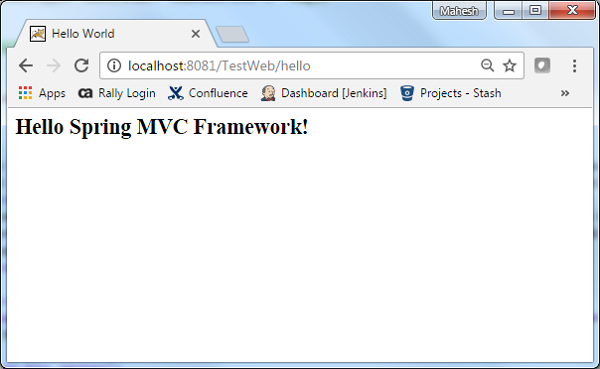📌 相关文章
- Spring MVC-资源包视图解析器示例
- Spring MVC-资源包视图解析器示例(1)
- Spring MVC-Xml视图解析器示例
- Spring MVC-Xml视图解析器示例(1)
- Spring MVC - 多解析器映射
- Spring MVC - 多解析器映射(1)
- Spring MVC-属性方法名称解析器示例
- Spring MVC-属性方法名称解析器示例(1)
- Spring MVC - 多视图页面
- Spring MVC - 多视图页面(1)
- Spring MVC多视图页面(1)
- Spring MVC多视图页面
- Spring MVC-多个解析器映射示例(1)
- Spring MVC-多个解析器映射示例
- Spring MVC-参数方法名称解析器示例
- Spring MVC-参数方法名称解析器示例(1)
- Spring MVC-有用的资源
- Spring MVC-有用的资源(1)
- spring mvc (1)
- 如何在 Spring MVC 中创建您的第一个视图?
- 如何在 Spring MVC 中创建您的第一个视图?(1)
- Spring MVC-可参数化的视图控制器示例
- Spring MVC-可参数化的视图控制器示例(1)
- spring mvc - 任何代码示例
- spring mvc - Java 代码示例
- 在视图中使用 mvc (1)
- spring mvc - Java (1)
- 带有 JSP 视图的 Spring MVC
- 在视图中使用 mvc - 任何代码示例
📜 Spring MVC-内部资源视图解析器示例
📅 最后修改于: 2020-11-11 06:32:09 🧑 作者: Mango
InternalResourceViewResolver用于将提供的URI解析为实际URI。以下示例显示了如何通过Spring Web MVC Framework使用InternalResourceViewResolver。 InternalResourceViewResolver允许映射带有请求的网页。
package com.tutorialspoint;
import org.springframework.stereotype.Controller;
import org.springframework.web.bind.annotation.RequestMapping;
import org.springframework.web.bind.annotation.RequestMethod;
import org.springframework.ui.ModelMap;
@Controller
@RequestMapping("/hello")
public class HelloController{
@RequestMapping(method = RequestMethod.GET)
public String printHello(ModelMap model) {
model.addAttribute("message", "Hello Spring MVC Framework!");
return "hello";
}
}
例如,使用上面的配置,如果是URI
-
/ hello被请求,DispatcherServlet会将请求转发到前缀+ viewname +后缀= /WEB-INF/jsp/hello.jsp。
首先,让我们拥有一个运行良好的Eclipse IDE,然后考虑以下步骤,以使用Spring Web Framework开发基于动态表单的Web应用程序。
| Step | Description |
|---|---|
| 1 | Create a project with a name TestWeb under a package com.tutorialspointas explained in the Spring MVC – Hello World Example chapter. |
| 2 | Create a Java classes HelloController under the com.tutorialspointpackage. |
| 3 | Create a view file hello.jsp under jsp sub-folder. |
| 4 | The final step is to create the content of the source and configuration files and export the application as explained below. |
HelloController.java
package com.tutorialspoint;
import org.springframework.stereotype.Controller;
import org.springframework.web.bind.annotation.RequestMapping;
import org.springframework.web.bind.annotation.RequestMethod;
import org.springframework.ui.ModelMap;
@Controller
@RequestMapping("/hello")
public class HelloController{
@RequestMapping(method = RequestMethod.GET)
public String printHello(ModelMap model) {
model.addAttribute("message", "Hello Spring MVC Framework!");
return "hello";
}
}
TestWeb-servlet.xml
hello.jsp
Hello World
${message}
完成创建源文件和配置文件后,导出应用程序。右键单击您的应用程序,使用“导出”→“ WAR文件”选项,并将TestWeb.war文件保存在Tomcat的webapps文件夹中。
现在,启动Tomcat服务器,并确保您能够使用标准浏览器从webapps文件夹访问其他网页。尝试访问URL – http:// localhost:8080 / TestWeb / hello ,如果Spring Web Application一切正常,我们将看到以下屏幕。
